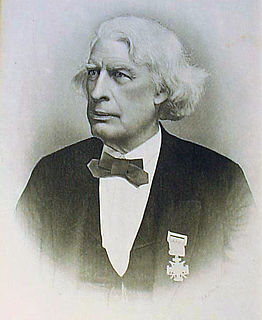A Quote by Charles Sanders Peirce
The truth is, that common-sense, or thought as it first emerges above the level of the narrowly practical, is deeply imbued with that bad logical quality to which the epithet metaphysical is commonly applied; and nothing can clear it up but a severe course of logic.
Related Quotes
I don't believe in god, so I don't have to make elaborately sounded structures. ... Pain always produces logic, which is very bad for you. ... As for measure and other technical apparatus, that's just common sense: if you're going to buy a pair of pants you want them to be tight enough so everyone will want to go to bed with you. There's nothing metaphysical about it.
Constitutions are not designed for metaphysical or logical subtleties, for niceties of expression, for critical propriety, for elaborate shades of meaning, or for the exercise of philosophical acuteness or judicial research. They are instruments of a practical nature, founded on the common business of human life, adapted to common wants, designed for common use, and fitted for common understandings.
Dialectic, which is the parent of logic, came itself from rhetoric. Rhetoric is in turn the child of the myths and poetry of ancient Greece. That is so historically, and that is so by any application of common sense. The poetry and myths are the response of a prehistoric people to the Universe around them made on the basis of Quality. It is Quality, not dialectic, which is the generator of everything we know.
The Cabal is of two kinds, theoretical and practical, with the practical Cabala, which is engaged in the construction of talismans and amulets, we have nothing to do. The theoretical is divided into the lineal and dogmatic. The dogmatic is nothing more than the summary of the metaphysical doctrine taught by the Cabalist doctors. It is, in other words, the system of the Jewish philosophy.
Philosophy would long ago have reached a high level if our predecessors and fathers had put this into practice; and we would not waste time on the primary difficulties, which appear now as severe as in the first centuries which noticed them. We would have the experience of assured phenomena, which would serve as principles for a solid reasoning; truth would not be so deeply sunken; nature would have taken off most of her envelopes; one would see the marvels she contains in all her individuals.
The Supreme Court said nothing about silliness, but I suspect it may play more of a role than one might suppose. People are, if anything, more touchy about being thought silly than they are about being thought unjust... Probably the first slave ship, with Negroes lying in chains on its decks, seemed commonsensical to the owners who operated it and to the planters who patronized it. But such a vessel would not be in the realm of common sense today. The only sense that is common, in the long run, is the sense of change.
He had a better mind and a more rigorous temperament than me; he thought logically, and then acted on the conclusion of logical thought. Whereas most of us, I suspect, do the opposite: we make an instinctive decision, then build up an infrastructure of reasoning to justify it. And call the result common sense.
Common sense is science exactly in so far as it fulfills the ideal of common sense; that is, sees facts as they are, or at any rate, without the distortion of prejudice, and reasons from them in accordance with the dictates of sound judgment. And science is simply common sense at its best, that is, rigidly accurate in observation, and merciless to fallacy in logic.
But though every created thing is, in this sense, a mystery, the word mystery cannot be applied to moral truth, any more than obscurity can be applied to light. ... Mystery is the antagonist of truth. It is a fog of human invention, that obscures truth, and represents it in distortion. Truth never envelops itself in mystery, and the mystery in which it is at any time enveloped is the work of its antagonist, and never of itself.
In [Aristotle's] formal logic, thought is organized in a manner very different from that of the Platonic dialogue. In this formal logic, thought is indifferent toward its objects. Whether they are mental or physical, whether they pertain to society or to nature, they become subject to the same general laws of organization, calculation, and conclusion - but they do so as fungible signs or symbols, in abstraction from their particular "substance." This general quality (quantitative quality) is the precondition of law and order - in logic as well as in society - the price of universal control.








































